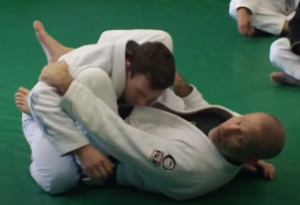
In the world of Brazilian Jiu-Jitsu, it’s not uncommon to encounter situations where appearances can be deceiving. Just like in our everyday lives, we may come across circumstances that challenge our initial perceptions and force us to think critically about what’s truly going on. In this article, we’ll delve into the concept of perception versus reality, using the example of playing guard in BJJ, and explore how challenging our assumptions can lead to better decision-making and problem-solving in all aspects of life.
Playing Guard in BJJ
At first glance, playing guard in BJJ may seem like a position of disadvantage. After all, you’re on your back, and your opponent is on top, seemingly in control of the situation. However, those who have spent time training in Brazilian Jiu-Jitsu understand that the guard is a powerful and versatile position, where a well-trained practitioner can launch a variety of attacks and sweeps, often catching their opponent off-guard.
This is an excellent example of how appearances can be deceptive, and the importance of not making hasty judgments based on superficial observations. The guard may look like a position of weakness to the untrained eye, but those familiar with the intricacies of BJJ know that it can be a position of immense control and opportunity. The ability to recognize the true potential of the guard position, despite its initial appearance, is a valuable lesson that can be applied to many aspects of life.
Challenging Assumptions in Life
Just as the guard position teaches us to question our assumptions in BJJ, it’s essential to adopt a similar mindset in our daily lives. Often, we may find ourselves making snap judgments or relying on preconceived notions without fully examining the situation at hand. By challenging our assumptions and considering alternative perspectives, we can gain a deeper understanding of the world around us and make more informed decisions.
For instance, picture yourself in a work environment where one of your colleagues seems to be uncooperative, and you might quickly assume they have a lack of motivation or a bad attitude. But if you take a closer look, you could find out that they’re actually dealing with personal issues or having a hard time grasping the task at hand. So, by questioning our first impressions and being open to other possibilities, we can tackle the situation with more empathy and understanding, ultimately leading to better results for everyone involved.
Benefits of Considering Alternative Perspectives
Embracing alternative perspectives and learning to question our assumptions can lead to improved decision-making and problem-solving, much like how understanding the potential of playing guard in BJJ opens up new possibilities for offensive techniques. This willingness to see beyond the surface and explore different viewpoints helps us become more adaptable and resilient in the face of challenges, both on and off the mats.
Take the Kimura from closed guard, for example. Once you grasp the overarching concept that being on the bottom can actually be advantageous, you can discover powerful offensive tools, like this submission technique. In the same way, when we open ourselves up to alternative perspectives in our personal relationships, we can foster stronger connections and create a more supportive environment. Similarly, in our professional lives, considering the ideas and opinions of others can drive innovation and collaboration, leading to success for both individuals and teams.
By applying the lessons learned from playing guard in BJJ to our everyday lives, we can unlock a world of opportunities and become better equipped to tackle challenges with an open mind and a willingness to explore new possibilities.
Practical Tips for Challenging Assumptions
So how can we actively work on questioning our own assumptions and biases? Here are a few strategies to help you get started:
- Practice empathy and active listening: Put yourself in someone else’s shoes and genuinely try to understand their point of view. Listen carefully to what they have to say, without interrupting or jumping to conclusions.
- Seek out diverse sources of information and experiences: Broaden your horizons by exposing yourself to different cultures, opinions, and perspectives. This could involve reading books and articles from various authors, attending workshops or events, or engaging in conversations with people from different backgrounds.
- Reflect on your thought processes: Take the time to analyze your thought patterns and identify any assumptions or biases that might be influencing your decisions. Ask yourself if there are alternative explanations or viewpoints that you may not have considered.
…and hey, don’t forget to create an angle when you’re finishing the Kimura!
Final Thoughts: Embracing the Lessons from BJJ’s Guard Position
In this article, we’ve explored the valuable lessons we can learn from playing guard in Brazilian Jiu-Jitsu and how these insights can extend far beyond the mats. We discussed the importance of questioning our assumptions and considering alternative perspectives in various aspects of our lives, from personal relationships to professional environments.
By drawing parallels between BJJ’s guard position and everyday situations, we’ve demonstrated the power of embracing alternative viewpoints and challenging our initial perceptions. This open-minded approach can lead to improved decision-making, problem-solving, and personal growth.
We also provided practical tips on how to actively question our own assumptions and biases, emphasizing the importance of empathy, active listening, and seeking diverse sources of information and experiences.
As we move forward in our journeys both on and off the mats, let’s remember the lessons learned from playing guard in Brazilian Jiu-Jitsu. By challenging our assumptions and embracing alternative perspectives, we can foster resilience, personal growth, and a richer life experience.